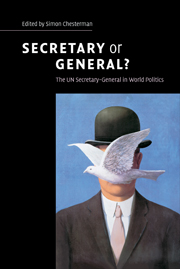Book contents
- Frontmatter
- Contents
- Contributors
- Foreword
- Acknowledgements
- Introduction: secretary or general?
- PART I Defining and refining the job description
- PART II Maintaining peace and security
- 4 Relations with the Security Council
- 5 Good offices and “groups of friends”
- 6 The bully pulpit
- PART III Normative and political dilemmas
- PART IV Independence and the future
- APPENDIX: selected documents on the Secretary-General
- Select bibliography
- Index
6 - The bully pulpit
Published online by Cambridge University Press: 06 January 2010
- Frontmatter
- Contents
- Contributors
- Foreword
- Acknowledgements
- Introduction: secretary or general?
- PART I Defining and refining the job description
- PART II Maintaining peace and security
- 4 Relations with the Security Council
- 5 Good offices and “groups of friends”
- 6 The bully pulpit
- PART III Normative and political dilemmas
- PART IV Independence and the future
- APPENDIX: selected documents on the Secretary-General
- Select bibliography
- Index
Summary
I have indicated [the war in Iraq] is not in conformity with the UN Charter, from our point of view and from the Charter point of view it was illegal.
Kofi AnnanThe UN Secretary-General's gratuitous comments were an extraordinarily undiplomatic and inappropriate intervention from a world figure who is supposed to be a neutral servant of the international community.
James Phillips and Nile GardinerSince at least Dag Hammarskjöld's time, the Secretary-General of the United Nations has played an important role in the UN's mission to maintain international peace and security, whether as a result of delegated power or through individual initiative. Chapter 4 by James Cockayne and David M. Malone in this volume examined the activities of all the Secretaries-General in front-line work and behind-the-scenes diplomacy in this sphere. Chapter 5 by Teresa Whitfield in this volume looked more closely at a particular form of diplomacy employed by the Secretary-General: the “group of friends”. Without a doubt, action has been a large part of the Secretary-General's armoury in helping to maintain international peace and security. But what about words? To what extent can and should the Secretary-General make use of the “bully pulpit” of the office in this context?
In the very delicate environment following the US-led invasion of Iraq in March 2003, Kofi Annan's September 2004 pronouncement on the legality of the war in Iraq generated a predictably severe reaction from the United States and its allies in the “coalition of the willing”. That reaction illustrates the risks inherent in what the Secretary-General chooses to say, particularly in public, about matters of peace and security.
- Type
- Chapter
- Information
- Secretary or General?The UN Secretary-General in World Politics, pp. 102 - 120Publisher: Cambridge University PressPrint publication year: 2007
- 2
- Cited by



